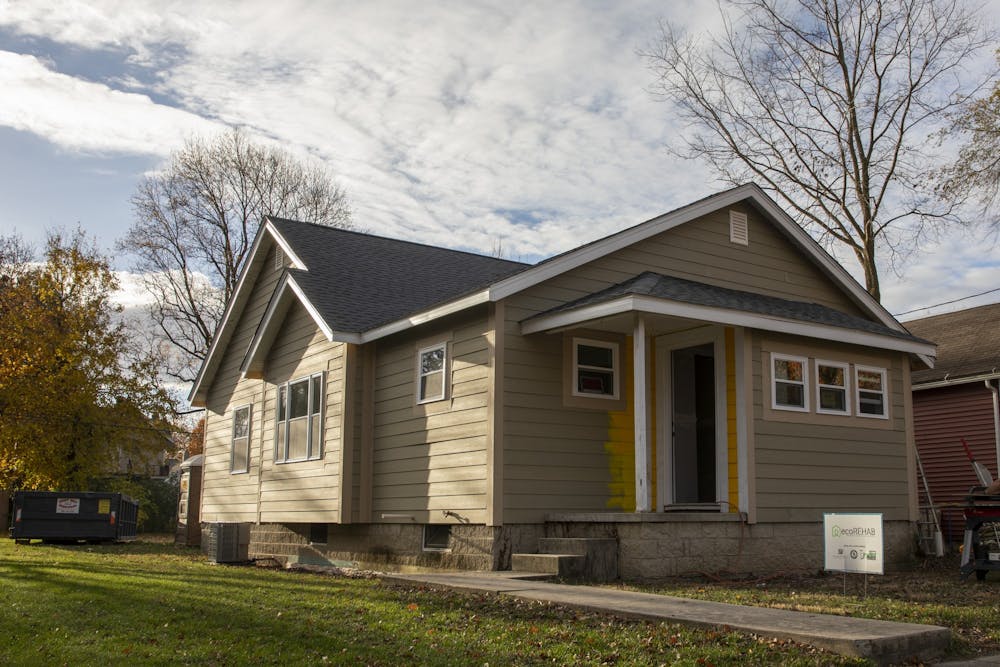Editor's Note: This story has been updated to reflect new information.
From working with college students to lifelong Muncie residents, Jason Haney’s key focus is education.
As the executive director of ecoREHAB, an organization whose mission is to rehabilitate and restore homes around Muncie, Haney teaches people in the Muncie community about the importance of sustainable building from a house’s foundation to its fixtures.
“Energy efficiency is very important,” Haney said. “The more energy efficient [a house] is, the cheaper it is to own and operate the house.”
In 2009, Muncie officials were considering tearing down abandoned and deteriorating homes throughout the neighborhoods surrounding Muncie’s downtown area. Jonathan Spodek, Ball State professor of architecture, intervened and suggested Muncie restore the homes into sustainable living spaces.
From there, ecoREHAB became an immersive learning class Spodek taught within Ball State’s College of Architecture and Planning where students learned how to restore deteriorating houses with sustainable methods. In December 2009, the organization started restoration work on its first property on E. Washington Street, located in Muncie’s Emily Kimbrough Historic District.
“It was all architecture students who designed the house,” Haney said. “[They] came up with the drawings, did all the work and basically renovated the home.”
After the students restored their first house in 2011, ecoREHAB has since restored seven more houses throughout Muncie’s neighborhoods with its three full-time employees — Haney, Brain Jones and Casey Eichenlaub. Most houses ecoREHAB restores go to a low-income family, as the energy-efficient methods ecoREHAB uses in its restorations helps these families save money with energy costs.
“Quite frankly, the leadership team that they have in ecoREHAB is fantastic,” Spodek said. “We started literally working out of my truck [with] all my tools.”
In January 2021, the organization will return to its immersive learning roots with its ecoSTEP program, which will combine in-class learning with trained professionals as well as hands-on learning in the field supervised by Haney and Eichenlaub.
Haney said his goal with the new 16-week ecoSTEP program is to give adults in Muncie a second chance at a steady career while helping a high-demand industry.
“[The applicants of the ecoSTEP program] didn't feel they needed the education, or [they] couldn't get the education, and [they] stuck around town and found that there weren't a lot of opportunities,” Haney said. “You get to that age where you're like, ‘Whoa, wait a minute. I'm on the wrong track here.’ [The ecoSTEP program] is an opportunity to get some job skills and training and to get back on the right path.”
Part of ecoSTEP's hands-on learning will take place at Madjax Makerforce — a coworking space in downtown Muncie designed to encourage collaborative community efforts. The class will teach basic construction and trade skills, such as introductions to tools and safety protocols. The main areas of focus are heating, ventilation and air conditioning as well as plumbing and electrical training.
Eastern Indiana Works, a Muncie nonprofit organization that aims to prepare individuals for high-demand employment opportunities, has also offered Occupational Safety and Health Administration certifications for ecoSTEP students.
Haney said he is currently working with Frank Baldwin, the president and CEO of Muncie Mission, to line up the start of the ecoSTEP program with the graduation dates of the Muncie Mission recovery program.
“You have this population that really has a need for something beyond themselves,” Haney said. “They need to be able to earn a decent wage. They need to probably do it with little to no education. There's something about being involved in construction where your self-esteem [and] your self-worth goes up.”
Contact Seth Stegall with comments at sdstegall@bsu.edu. Contact Sophie Nulph with comments at smnulph@bsu.edu.





